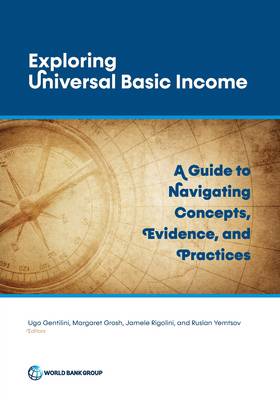
- Afhalen na 1 uur in een winkel met voorraad
- Gratis thuislevering in België vanaf € 30
- Ruim aanbod met 7 miljoen producten
- Afhalen na 1 uur in een winkel met voorraad
- Gratis thuislevering in België vanaf € 30
- Ruim aanbod met 7 miljoen producten
Zoeken
Exploring Universal Basic Income
A Guide to Navigating Concepts, Evidence, and Practices
World Bank
Paperback | Engels
€ 80,45
+ 160 punten
Omschrijving
Universal basic income (UBI) is emerging as one of the most hotly debated issues in development and social protection policy. But what are the features of UBI? What is it meant to achieve? How do we know, and what don't we know, about its performance? What does it take to implement it in practice? Drawing from global evidence, literature, and survey data, this volume provides a framework to elucidate issues and trade-offs in UBI with a view to help inform choices around its appropriateness and feasibility in different contexts. Specifically, the book examines how UBI differs from or complements other social assistance programs in terms of objectives, coverage, incidence, adequacy, incentives, effects on poverty and inequality, financing, political economy, and implementation. It also reviews past and current country experiences, surveys the full range of existing policy proposals, provides original results from micro-tax benefit simulations, and sets out a range of considerations around the analytics and practice of UBI.
Specificaties
Betrokkenen
- Auteur(s):
- Uitgeverij:
Inhoud
- Aantal bladzijden:
- 334
- Taal:
- Engels
Eigenschappen
- Productcode (EAN):
- 9781464814587
- Verschijningsdatum:
- 25/11/2019
- Uitvoering:
- Paperback
- Formaat:
- Trade paperback (VS)
- Afmetingen:
- 175 mm x 251 mm
- Gewicht:
- 680 g

Alleen bij Standaard Boekhandel
+ 160 punten op je klantenkaart van Standaard Boekhandel
Beoordelingen
We publiceren alleen reviews die voldoen aan de voorwaarden voor reviews. Bekijk onze voorwaarden voor reviews.








